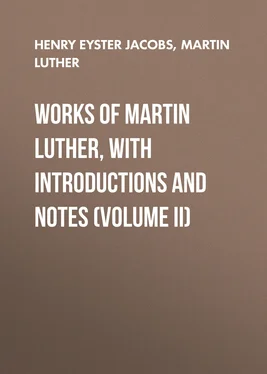Henry Eyster Jacobs - Works of Martin Luther, with Introductions and Notes (Volume II)
Здесь есть возможность читать онлайн «Henry Eyster Jacobs - Works of Martin Luther, with Introductions and Notes (Volume II)» — ознакомительный отрывок электронной книги совершенно бесплатно, а после прочтения отрывка купить полную версию. В некоторых случаях можно слушать аудио, скачать через торрент в формате fb2 и присутствует краткое содержание. Жанр: foreign_prose, foreign_religion, Философия, foreign_psychology, foreign_antique, на немецком языке. Описание произведения, (предисловие) а так же отзывы посетителей доступны на портале библиотеки ЛибКат.
- Название:Works of Martin Luther, with Introductions and Notes (Volume II)
- Автор:
- Жанр:
- Год:неизвестен
- ISBN:нет данных
- Рейтинг книги:3 / 5. Голосов: 1
-
Избранное:Добавить в избранное
- Отзывы:
-
Ваша оценка:
- 60
- 1
- 2
- 3
- 4
- 5
Works of Martin Luther, with Introductions and Notes (Volume II): краткое содержание, описание и аннотация
Предлагаем к чтению аннотацию, описание, краткое содержание или предисловие (зависит от того, что написал сам автор книги «Works of Martin Luther, with Introductions and Notes (Volume II)»). Если вы не нашли необходимую информацию о книге — напишите в комментариях, мы постараемся отыскать её.
Works of Martin Luther, with Introductions and Notes (Volume II) — читать онлайн ознакомительный отрывок
Ниже представлен текст книги, разбитый по страницам. Система сохранения места последней прочитанной страницы, позволяет с удобством читать онлайн бесплатно книгу «Works of Martin Luther, with Introductions and Notes (Volume II)», без необходимости каждый раз заново искать на чём Вы остановились. Поставьте закладку, и сможете в любой момент перейти на страницу, на которой закончили чтение.
Интервал:
Закладка:
This is the place to say too that the fasts should be matters of liberty, and all sorts of food made free, as the Gospel makes them [Matt. 15:11]. For at Rome they themselves laugh at the fasts, making us foreigners eat the oil with which they would not grease their shoes, and afterwards selling us liberty to eat butter and all sorts of other things; yet the holy Apostle says that in all these things we already have liberty through the Gospel [1 Cor. 10:25 ff.]. But they have caught us with their canon law and stolen our rights from us, so that we may have to buy them back with money. Thus they have made our consciences so timid and shy that it is no longer easy to preach about this liberty because the common people take such great offence, thinking it a greater sin to eat butter than to lie, to swear, or even to live unchastely. Nevertheless, what men have decreed, that is the work of man; put it where you will 292 292 i. e., Even into the law of the church.
, nothing good ever comes out of it.
[Sidenote: Prohibition of Pilgrimages]
20. The forest chapels and rustic churches 293 293 Die wilden Kapellen und Feldkirchen , i. e., churches which are built in the country, where there are no congregations.
must be utterly destroyed,—those, namely, to which the recent pilgrimages have been directed,—Wilsnack 294 294 A little town in East Prussia, where was displayed a sacramental wafer, said to have been miraculously preserved from a fire which destroyed the church in 1383. It was alleged that at certain times this wafer exuded drops of blood, reverenced as the blood of Christ, and many miracles were said to have been performed by it. Wilsnack early became a favorite resort for pilgrims. In 1412 the archbishop of Prague, at the instigation of John Hus, forbade the Bohemians to go there. Despite the protests of the Universities of Leipzig and Erfurt, Pope Eugenius IV in 1446 granted special indulgences for this pilgrimage, and the popularity of the shrine was undiminished until the time of the Reformation. Cf. Realencyk , xxi, pp. 347 ff.
, Sternberg 295 295 In Mecklenburg, where another relic of "the Holy Blood" was displayed after 1491. C. Benrath, pp. 104 f.
, Trier 296 296 The "Holy Coat of Trier" was believed by the credulous to be the seamless coat of Christ, which the soldiers did not rend. It was first exhibited in 1512, but was said to have been presented to the cathedral church of Trier by the Empress Helena, mother of Constantine the Great.
, the Grimmenthal 297 297 Pilgrimage to the Grimmenthal in Meiningen began in 1499. An image of the Virgin, declared to have been miraculously created, was displayed there, and was alleged to work wonderful cures, especially of syphilis.
, and now Regensburg 298 298 The "Fair Virgin ( die schöne Maria ) of Regensburg" was an image of the Virgin similar to that exhibited in the Grimmenthal. The shrine was opened March 25, 1519, and within a month 50,000 pilgrims are said to have worshipped there. ( Weimar Ed. , VI, 447, note 1). For another explanation see Benrath, p. 105.
and a goodly number of others. Oh, what a terrible and heavy account will the bishops have to render, who permit this devilish deceit and receive its profits! 299 299 The pilgrimages were a source of large revenue, derived from the sale of medals which were worn as amulets, the fees for masses at the shrines, and the free-will offerings of the pilgrims. A large part of this revenue accrued to the bishop of the diocese, though the popes never overlooked the profits which the sale of indulgences or worship at these shrines could produce. In the Gravamina of 1521 complaint is made that the bishops demand at least 25 to 33 per cent, of the offerings made at shrines of pilgrimage (Wrede, op. cit. , II, 687).
They should be the first to forbid it, and yet they think it a divine and holy thing, and do not see that it is the devil's doing, to strengthen avarice, to create a false, feigned faith, to weaken the parish churches, to multiply taverns and harlotry, to waste money and labor, and to lead the poor folk by the nose. If they had only read the Scriptures to as good purpose as they have read their damnable canon law, they would know well how to deal with this matter.
That miracles are done at these places does not help things, for the evil spirit can do miracles, as Christ has told us in Matthew xxiv [Matt. 24:24]. If they took the matter seriously and forbade this sort of thing, the miracles would quickly come to an end; on the other hand, if the thing were of God their prohibition would not hinder it [Acts 5:39]. And if there were no other evidence that it is not of God, this would be enough,—that people run to these places in excited crowds, as though they had lost their reason, like herds of cattle; for this cannot possibly be of God. Moreover, God has commanded nothing of all this; there is neither obedience nor merit in it; the bishops, therefore, should boldly step in and keep the folk away. For what is not commanded—and is concerned for self rather than for the commands of God—that is surely the devil himself. Then, too, the parish churches receive injury, because they are held in smaller honor. In short, these things are signs of great unbelief among the people; if they truly believed, they would have all that they need in their own churches, for to them they are commanded to go.
[Sidenote: Canonisations to be Prohibited]
But what shall I say? Every one 300 300 i. e., Every bishop.
plans only how he may establish and maintain such a place of pilgrimage in his diocese and is not at all concerned to have the people believe and live aright; the rulers are like the people; one blind man leads another [Matt. 13:14]. Nay, where pilgrimages are not successful, they begin to canonise saints 301 301 The possession of a saint gave a church a certain reputation and distinction, which was sufficiently coveted to make local Church authorities willing to pay roundly for the canonisation of a departed bishop or other local dignitary. Cf. Hutten's Vadiscus (Böcking, IV, 232).
, not in honor of the saints—for they are sufficiently honored without canonisation—but in order to draw crowds and bring in money. Pope and bishop help along; it rains indulgences; there is always money enough for that. But for what God has commanded no one provides; no one runs after these things; there is no money or them. Alas, that we should be so blind! We not only give the devil his own way in his tricks, but we even strengthen him in his wantonness and increase his pranks. I would that the dear saints were let in peace, and the poor folk not led astray! What spirit has given the pope the authority to canonise the saints? Who tells him whether they are saints or not? Are there not already sins enough on earth, that we too must tempt God, interfere in His judgment and set up the dear saints as lures for money?
Therefore I advise that the saints be left to canonise themselves. Yea, it is God alone who should canonise them. And let every man stay in his own parish, where he finds more than in all the shrines of pilgrimage, even though all the shrines were one. Here we find baptism, the sacrament, preaching and our neighbor, and these are greater things than all the saints in heaven, for it is by God's Word and sacrament that they have all been made saints. So long as we despise such great things God is just in the wrathful judgment by which He appoints the devil to lead us hither and thither, to establish pilgrimages, to found churches and chapels, to secure the canonisation of saints, and to do other such fool's-works, by which we depart from true faith into new, false misbelief. This is what he did in olden times to the people of Israel, when he led them away from the temple at Jerusalem to countless other places, though he did it in the name of God and under the plausible guise of holiness, though all the prophets preached against it and were persecuted or so doing. But now no one preaches against it, perhaps or fear that pope, priests and monks would persecute him also. In this way St. Antoninus of Florence 302 302 Archbishop of Florence (died 1450). He was canonised, May 31, 1523, by Pope Hadrian VI. When Luther wrote this the process of canonisation had already begun.
and certain others must now be made saints and canonised, that their holiness, which would otherwise have served only for the glory of God and as a good example, may serve to bring in fame and money.
Интервал:
Закладка:
Похожие книги на «Works of Martin Luther, with Introductions and Notes (Volume II)»
Представляем Вашему вниманию похожие книги на «Works of Martin Luther, with Introductions and Notes (Volume II)» списком для выбора. Мы отобрали схожую по названию и смыслу литературу в надежде предоставить читателям больше вариантов отыскать новые, интересные, ещё непрочитанные произведения.
Обсуждение, отзывы о книге «Works of Martin Luther, with Introductions and Notes (Volume II)» и просто собственные мнения читателей. Оставьте ваши комментарии, напишите, что Вы думаете о произведении, его смысле или главных героях. Укажите что конкретно понравилось, а что нет, и почему Вы так считаете.












